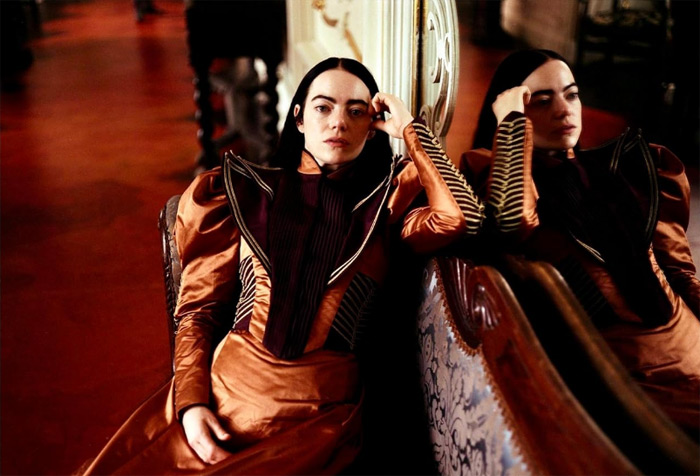Directed by Yorgos Lanthimos
Released on January 12th, 2024
Showing at Picturehouse, Liverpool
Reviewed by Nick Daly
I sat tight, lubricated with wine, in anticipation for Yorgos Lanthimos’ Poor Things. You have to be. The Greek director is notorious for his absurd, challenging films, and Poor Things didn’t appear to stray from formula. It certainly doesn’t, but perhaps most shocking of all is that it ultimately becomes one of Lanthimos’ most crowd-pleasing works, and would make a superb double-bill with last year’s mega blockbuster Barbie.
Certainly, there’s no shades of pink or Lizzo on the soundtrack. In fact, Poor Things begins in black and white, with Emma Stone’s Bella Baxter stumbling around with the mind of a toddler. She’s been resurrected by unorthodox surgeon Godwin (a reliably great Willem Dafoe), who, following her suicide, has replaced Bella’s brain with that of her unborn child. Her intelligence developing rapidly and craving freedom, she encounters debauched lawyer Duncan (Mark Ruffalo) who has taken a fondness to her. This is Bella’s gateway to independence. Godwin must let his creation go.
The film bursts into colour as Bella’s world expands. She is brand new. A fully-formed woman reborn with a liberated mindset free from societal pressures, and it’s completely exhilarating to watch. She devours Portuguese pastries, dances erratically and has continuous sex simply because she wants to. However, there’s an unsettling undercurrent that’s hard to shake off; the morally questionable notion of an older man enamoured with a woman who has a naive, childlike mind. I suppose it wouldn’t be a Lanthimos film without some element of disturbance.
The surrounding set design aids the plot wonderfully. A retro-futuristic world – Victoriana combined with steampunk – conjuring a heightened reality that puts the viewer firmly in Bella’s eyes. Jerskin Fendrix’s jarring score, meanwhile, is a jolt to the senses, perfectly encapsulating the notion of a person experiencing everything in the world for the first time.
As the film and Bella’s mind progresses, her odyssey of self-discovery and sexual liberation gradually becomes more complex. Societal issues and philosophical ideas ‘bounce around her head and heart like lights in a storm.’ Mirroring this is Duncan’s increasing frustration at his inability to restrain Bella. He fights with strangers, snatches books from her hands and gradually unravels while Bella pieces herself together. Intriguingly, the film appears to have something interesting to say about some men’s desire to infantilise women and hinder their growth.
Emma Stone is now at an interesting point in her career. Starting out as playing husky-voiced characters with a few quirks, she delves unabashedly into eccentricity in Poor Things, and it becomes her. Similarly, Mark Ruffalo revels in the freedom outside of his Marvel contract. He gives a comically exaggerated performance so far removed from anything he’s ever done before.
Despite all of its eccentricities, at its core Poor Things is a simple story of female empowerment, complete with a fist-pumping, cocktail-sipping resolution. After watching Barbie have an existential crisis over the state of our society, there’s a catharsis in Bella’s completely rejection of it to explore and thrive in her own way. You could say Bella is Barbie’s evil twin, I’d say she’s more like her brilliant, eccentric cousin.
